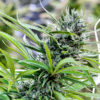
Concentrates
Morocco’s GDP Is 23% Hash-Based: The DEA Has Taken Notice
After a 20-year absence, the DEA has returned to Morocco and resumed enforcement operations in the capital city of Rabat. Their mission is to interrupt the flow of hashish into Europe through Spain — an illicit trade route that, by some estimates, accounts for nearly a quarter of Morocco’s GDP.
It’s officially tasked with enforcing domestic narcotics law and interdicting drugs entering the United States, but the Drug Enforcement Administration has also been a global police force since its 1973 inception.
The DEA inherited a global network of several dozen “anti-drug” offices in countries within the U.S. sphere of influence, and as global demand for drugs continued unabated, spent the next few decades opening dozens more.
One of the DEA’s first offices was in Rabat, Morocco’s capital and its most populous city. The agency has opened and closed the Rabat office three times, most recently as attention shifted to cocaine and heroin originating in South America and Mexico.
But in 2015, the DEA returned to Rabat after a 20-year absence, and will likely be there to stay (at least as long as the U.S. fields a police force with a global mandate), because Rabat has more marijuana than anywhere else in the world.
Morocco is now “the world’s largest producer and exporter of cannabis,” according to the U.S. Department of State.
Moroccan cannabis farmers grew 700 metric tons during the 2015-2016 growing season, which if processed and sold would account for “as much as 23 percent of Morocco’s $100 billion GDP.”
Far be it from us to question the unimpeachable authority of the U.S. government, but just for comparison’s sake: if as much as 60 percent of the marijuana smoked in America originates in California (as some U.S. authorities say), and if Americans spent about $40 billion on illegal weed (as a marijuana market-research firm estimates), then California is either not too far behind Morocco or has already achieved equal status.
But when it comes to Moroccan herb, authorities say most of it goes straight to Europe — in the form of hash. Then the cool kids living in social democracies with nationalized health care mix it with tobacco and roll it into spliffs — which is why much of the marijuana research originating from Europe should be classified as “marijuana-tobacco” research.
Blinding-fast speedboats (similar to the lightweight, fiberglass-hulled panga boats favored by drug smugglers associated with Mexican cartels) ferry hashish north, from Morocco to the Spanish coast. And nobody, not the DEA, nor the Moroccan authorities nor anyone else, seem to be able to do anything about it!
American officials also believe that “corruption is prevalent at all levels of Moroccan society,” a revelation courtesy of the diplomatic cables released on WikiLeaks in 2011.
The widely held public suspicion is that the Moroccan government has a sizable hand in the marijuana trade. But just how large a hand is for State Department and freelance security analysts to estimate — while we freely speculate.
Morocco is a constitutional monarchy, where the king enjoys absolute power and is able to dissolve elected government by fiat — think Saudi Arabia more than the United Kingdom. All major business decisions in Morocco involve King Mohammed VI and two of his top advisers.
Depressingly, Morocco publicly states it wants to address its drug problem in American fashion. There is significant infighting between police forces, so “some Moroccan civil society commentators have advocated for creating an agency dedicated to combating drug trafficking,” as the State Department observed. This Moroccan DEA would run stings using “undercover operations,” like buy-busts.
Currently, about 25 percent of the country’s relatively small number of prison inmates are there for drugs. If the DEA model is followed to the fullest, that number may soon be an all-American 50 percent.
Or, Morocco could try something else. Here’s hoping.
TELL US, do you think the U.S. should be spending national resources on foreign drug enforcement?
























